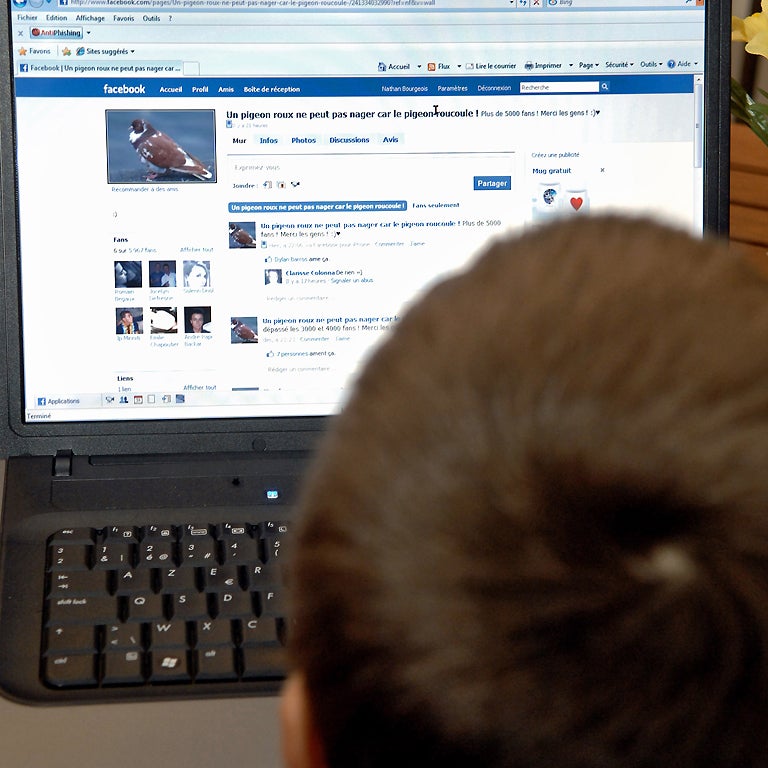Internet companies oppose US update of child privacy law

Your support helps us to tell the story
From reproductive rights to climate change to Big Tech, The Independent is on the ground when the story is developing. Whether it's investigating the financials of Elon Musk's pro-Trump PAC or producing our latest documentary, 'The A Word', which shines a light on the American women fighting for reproductive rights, we know how important it is to parse out the facts from the messaging.
At such a critical moment in US history, we need reporters on the ground. Your donation allows us to keep sending journalists to speak to both sides of the story.
The Independent is trusted by Americans across the entire political spectrum. And unlike many other quality news outlets, we choose not to lock Americans out of our reporting and analysis with paywalls. We believe quality journalism should be available to everyone, paid for by those who can afford it.
Your support makes all the difference.Facebook, Twitter and Google have warned the Obama administration that a proposal to beef up child privacy laws could hamper America's ability to "like," tweet and share information across the Web.
And aside from hurting their potential to make fortunes from all that information swapping, the Internet giants say new rules would undermine free speech.
The Silicon Valley companies filed written responses to plans by the Federal Trade Commission to update the Children's Online Privacy Protection Act of 1998, or COPPA, a law written before a majority of U.S. youths owned smartphones, apps began tracking locations and Facebook's "like" button was ubiquitous on the Web.
They protested plans to sweep more firms under the watch of the FTC, including Facebook, Digg, Twitter, Reddit and Google+, which all embed buttons called "plugins" on millions of other sites to allow quick access for users.
And each time a user clicks or taps a plugin, those social networks note the action and use it for adveristing.
The proposal is "unworkable," Twitter said in comments filed late last week to the FTC. Making the host site responsible when partner sites do wrong would discourage the companies from linking to one another and lead to a "diminishing of freedom of expression."
Facebook agreed that the FTC's proposal "raises First Amendment concerns," adding that the FTC "fundamentally misunderstands the relationship between plugin providers and website publishers."
Google said the new rules would "undermine the ability of sites and services to provide engaging online resources to children. COPPA should not become a barrier to children's ability to access appropriate and beneficial online resources for education and entertainment."
But regulators and privacy advocates say the Web's most powerful firms should take more responsibility for the benefits they get from their ominpresence online.
"The fact of the matter is, there is information being collected from children through child-directed websites and online services, and the question is who should be responsible," said Phyllis Marcus, a senior staff lawyer at the FTC's Bureau of Consumer Protection. The FTC aims to finalize new rules by the end of the year.
Under the law, companies must seek permission from parents to collect data from users age 12 and under. The sites also are required to clearly identify that they are child-oriented and that they are collecting personal information such as email addresses, names, phone numbers and demographic data.
Facebook and Twitter set minimum age limits at 13. But Consumer Reports determined two years ago that at least 7 million people under 13 are Facebook users - a figure experts say is wildly conservative today and is a problem at Twitter and other social networks, too.
The companies say they don't have the resources or ability to track all the users of their services on other sites.
Other firms complained that the rules would also hold software platforms such as Apple's iOS or Google's Android responsible for the practices of the hundreds of thousands of apps that run on their smartphones and tablets.
"Congress does not make department stores liable for the data collection practices of the companies that sell children's products in a department store," Apple vice president Catherine Novelli wrote in comments filed last week. The proposed rules would "create an impossible burden for platform providers."
The complaints met harsh protest by child advocacy and privacy groups, who say the companies need to step up their efforts to protect children's privacy online.
"It's a pathetic argument for the richest companies in the world to say they don't have the resources or ability to protect children," said Jim Steyer, head of child advocacy group Common Sense Media in San Francisco and a professor at Stanford University.
Join our commenting forum
Join thought-provoking conversations, follow other Independent readers and see their replies
Comments